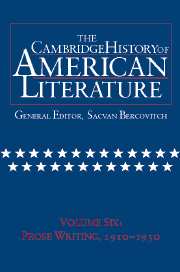Book contents
- Frontmatter
- Introduction
- A Cultural History of the Modern American Novel: Introduction
- 1 A Dream City, Lyric Years, and a Great War
- 2 Fiction in a Tme of Plenty
- 3 The Fate of Writing During the Great Depression
- Fictions of the Harlem Renaissance
- 1 A New Negro?
- 2 Black Manhattan
- 3 Avatars and Manifestos
- 4 Harlem as A State of Mind: Hughes, McKay, Toomer
- 5 A New Negro, A New Woman: Larsen, Fauset, Bonner
- 6 “Dark - Skinned Selves Without Fear or Shame”: Thurman and Nugent
- 7 Genre in The Renaissance: Fisher, Schuyler, Cullen, White, Bontemps
- 8 Southern Daughter, Native Son: Hurston and Wright
- 9 Black Modernism
- Ethnic Modernism
- Chronology
- Bibliography
- Index
1 - A New Negro?
from Fictions of the Harlem Renaissance
Published online by Cambridge University Press: 28 March 2008
- Frontmatter
- Introduction
- A Cultural History of the Modern American Novel: Introduction
- 1 A Dream City, Lyric Years, and a Great War
- 2 Fiction in a Tme of Plenty
- 3 The Fate of Writing During the Great Depression
- Fictions of the Harlem Renaissance
- 1 A New Negro?
- 2 Black Manhattan
- 3 Avatars and Manifestos
- 4 Harlem as A State of Mind: Hughes, McKay, Toomer
- 5 A New Negro, A New Woman: Larsen, Fauset, Bonner
- 6 “Dark - Skinned Selves Without Fear or Shame”: Thurman and Nugent
- 7 Genre in The Renaissance: Fisher, Schuyler, Cullen, White, Bontemps
- 8 Southern Daughter, Native Son: Hurston and Wright
- 9 Black Modernism
- Ethnic Modernism
- Chronology
- Bibliography
- Index
Summary
What do we know today about the literary phenomenon called by some the Harlem Renaissance, by others the New Negro movement? Was it a quixotic though noble failure? Was it the triumph of a black modernism paradoxically ignited by a Victorian brown bourgeoisie? Were its authors who plumbed the color line seeking to remake the very notion of race? How salient a category was gender to its creators? Was its literary nationalism part of larger global movements? A long scholarly debate surrounds the Harlem Renaissance – a debate about its meanings, parameters, and, indeed, its very existence. My title, “Fictions of the Harlem Renaissance,” is meant both to invoke the swirling stereotypes and shibboleths of the era, and to indicate the vitality of the literature in our time.
In the early twenty-first century, the scholarly consensus on the Harlem Renaissance runs as follows: the African American intellectual response to historical and social forces in the period immediately following World War I was a cultural construct, a belles-lettristic sleight of hand in which black intellectuals and writers elegantly tossed together a coherent movement that never actually took place. Said another way, the Harlem Renaissance did not really exist – if by a literary movement’s existence we mean to indicate an unselfconscious, spontaneous upwelling of artistic endeavor, one untainted by political ideology or commercial encouragement. This belief in aesthetic purity is a lovely sentiment, but few literary movements are innocent of social and economic factors. Almost universally, critics now acknowledge that the Harlem Renaissance was based on artifice and politically motivated social engineering.
- Type
- Chapter
- Information
- The Cambridge History of American Literature , pp. 283 - 288Publisher: Cambridge University PressPrint publication year: 2002



